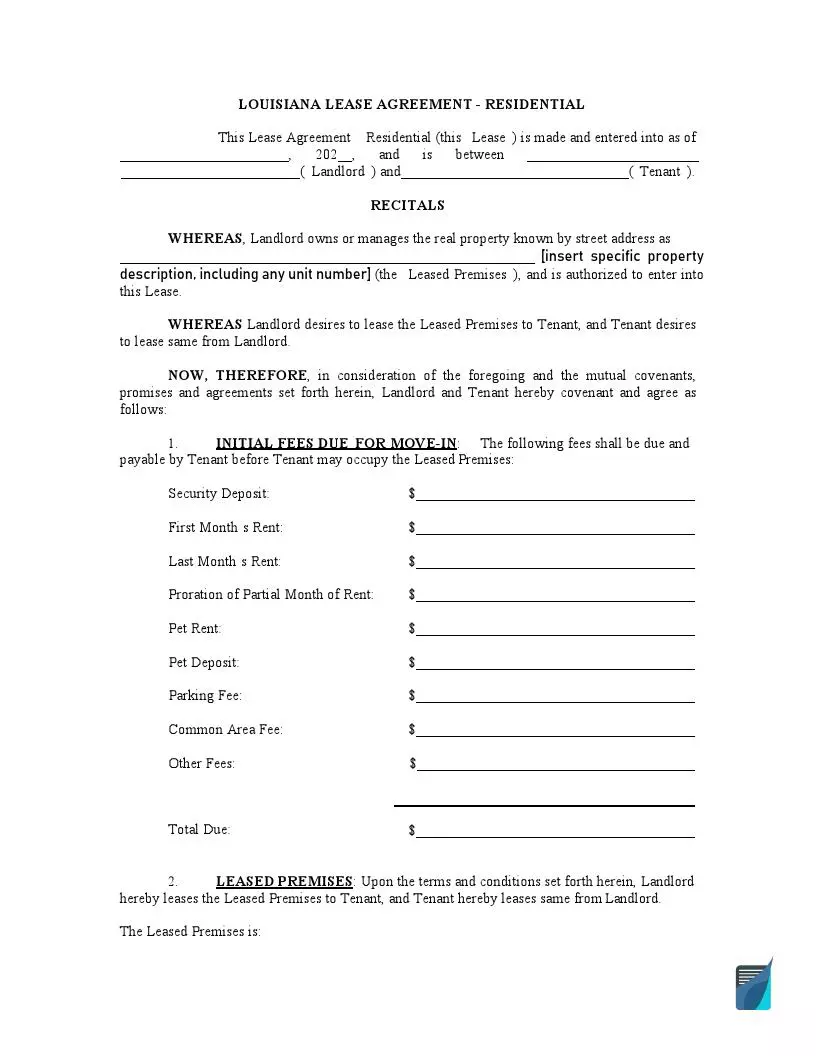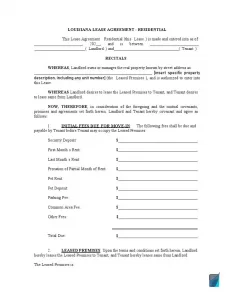Louisiana Rental Lease Agreement Forms
A Louisiana rental lease agreement is a kind of contract that outlines the rights and the responsibilities of the lessor and the lessee in relation to the property lease in a single document. The parties can be called differently in different forms and states, but the most commonly used terms, apart from the “lessor” and the “lessee,” are the “landlord” and the “tenant.”
There can be different types of leases, but private leases are discussed more often. You can have a lease for the whole property or just one room. The lessee and the leaseholder can establish different periods of lease: it can be up to an explicitly stated date or on a month-to-month basis. It most commonly changes after a period of one or two years when it becomes a month-to-month type.
Lease agreements are essential for protecting the rights of both parties. Both the tenant and the lessor need to make sure that the property will be looked after, is safe, and that such details as the period of the lease and the rent amount are clearly mentioned.
In Louisiana, lease agreements can be oral or written. Oral agreements are almost impossible to prove in court, so the state of Louisiana strongly recommends having your lease in writing.
If you want to start creating your free lease agreement, use our form building software for the best results.

Build Your Document
Answer a few simple questions to make your document in minutes
Save and Print
Save progress and finish on any device, download and print anytime
Sign and Use
Your valid, lawyer-approved document is ready
Louisiana Laws and Lease Requirements
In Louisiana, leases can be joined between roommates. In such a case, it is important to remember that both co-tenants are responsible for any damages to the property or breaches of the lease agreement.
Late fees in Louisiana can only be charged if it is outlined in the lease agreement.
Security Deposit
This is a crucially important part of any lease agreement. Security or damage deposits secure the right of the lessor to cover any damages or unpaid rent. This never applies to normal wear and tear, meaning that the lessee will not be liable for the damages that have happened naturally, without their intent or accidents, in the course of using the property.
A ‘pet deposit’ is a specific kind of security deposit. It is not necessary but is very common in leases that allow pets.
The Lessee’s Deposit Act states that in Louisiana, the landlord must return the deposit within one month from the termination of the lease. There is no limit on how much the security deposit can be.
The lessees should ask for the security deposit and the pet deposit, if there is one, to be returned to them by mail, together with receipts, on the last day of the tenancy.
Landlord’s Right of Entry
In Louisiana, the laws do not require the landlord to notify the tenant before entering the property. It is a commonly discussed issue in a lease agreement, though. In any case, even if the lease agreement does not contain such a clause, it is still recommended that the lessor enters the property at reasonable times and with notice.
Mandatory Disclosures
Before outlining Louisiana-specific rental disclosures, it should be noted that the landlords are required by federal laws to provide a disclosure on lead-based paint in houses built before 1978.
Rental agreements in Louisiana should include the following points:
- The names of the lessee and the leaseholder
- The amount of rent
- Maintenance responsibilities of both parties
- Information on penalties for the late rent payments
In addition to the mandatory disclosures, several other matters are commonly discussed in lease agreements. These include whether the tenant can sublet the property, on what conditions, whether they can make alterations, and the landlord’s rights of entry, for example.
Louisiana Rental Lease Agreement Form Details
| Document Name | Louisiana Rental Lease Agreement Form |
| Other Names | LA Rental Lease, Louisiana Residential Lease Agreement |
| Relevant Laws | Louisiana Attorney General’s Guide to Landlord and Tenant Laws |
| Security Deposit Amount | No limit |
| Security Deposit Return | One month from termination date |
| Avg. Time to Fill Out | 18 minutes |
| # of Fillable Fields | 119 |
| Available Formats | Adobe PDF |


Take a look at various other Louisiana forms downloaded by FormsPal users. Check out our step-by-step builder to customize any of these documents to your needs.
Other Rental Lease Agreement Forms by State
